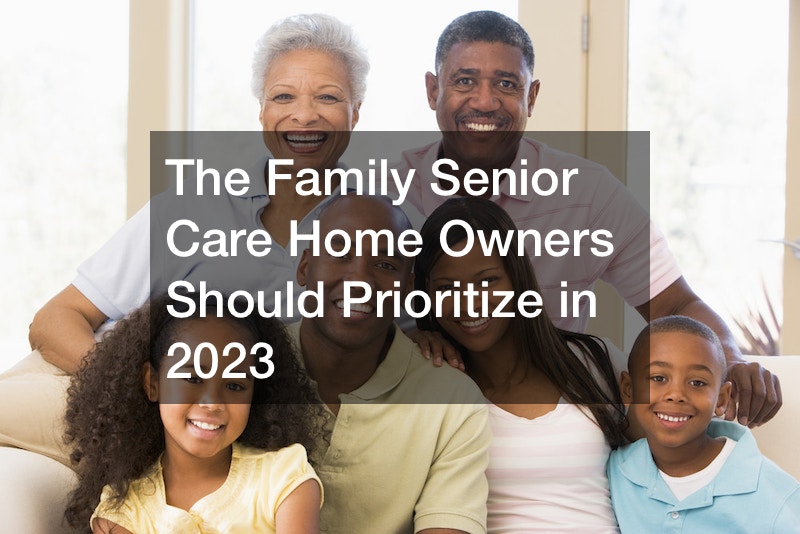Family senior care homes have become a necessity today. The involvement required to care for aging family members is daunting. Many opt to pay for care at a senior care home.
As a family senior care home owner, you must assure such family members that they’re making the right choice by getting help and their loved one will get the best care. In 2023, many developments have come up that can affect the senior care industry. Senior care home owners should be keen on following the developments in the industry and focus on improving their facilities and the services they provide. Here are a few tips that can help.
1. Injury Prevention and Rehabilitation

As you run your family senior care home, accidents will likely occur. Most older people live with conditions like dementia, which affects their coordination and motor abilities. Some are heavily medicated, impairing coordination, while others have poor vision. The potential for accidents is quite high. This is why you should get proactive and take steps to prevent accidents from happening.
All parties must be involved in injury prevention. First off, as the family senior care home owner, you need to provide things like ramps beside stairs, ensuring the floors are even and not slippery, customizing the curb to accommodate older people, furnishing the place with appropriate furniture and fittings like firm handrails, and installing raised toilet seats and proper lighting. You must also avail yourself of all the necessary assistive equipment to help seniors, including wheelchairs, walkers, and canes.
On the part of your staff of caregivers, they must be certified and competent enough to know how to uphold injury prevention in and out of the home. Caregivers should know the professional standards of use of assistive equipment, taking advantage of them whenever possible. All steps should always be adhered to, with no shortcuts.
Caregivers must be careful when there’s a change in floor type and avoid slippery floors. They should also ensure the client is in appropriate footwear and wearing their glasses and hearing aids where applicable. In case of injuries, consider partnering with a sports injury rehab facility.
2. Self-Care and Presentation
As a family senior care home owner, always hire professional caregivers. Be deliberate about finding the best caregivers available in the market. Ensure you personally vet anyone you want to hire and look for the qualities you know will ensure quality services in your facility.
Professional caregivers should always be clean and well-groomed. Demand that men keep short, manageable hair, shower every day, and maintain good oral hygiene. The same goes for the ladies, but they should keep their nails short, avoid excessive makeup, and not wear perfume.
A professional caregiver should also possess certain presentational qualities like being able to listen patiently. Their responses and overall mode of addressing clients and amongst themselves must also be cordial and professional. They should also be willing to cooperate and provide care to their clients like they were their own. The task of caregiving can be stressful and daunting. So, as the owner, ensure you give your staff time off so they can seek therapy and join support groups if need be.
You can also help your seniors with self-care and presentation. Some procedures can offer a solution for those whose hair is falling off. For example, you can help them access the best scalp micropigmentation Los Angeles.
3. Chronic Disease Treatment

Chronic diseases, by definition, don’t go away. As a family senior care home owner, you need to know what it takes to manage such clients and adequately prepare for it. It can get complex because some clients may have a combination of more than one or two chronic diseases together. The idea is to be holistic. Think about the condition as a whole; you’ll seldom handle one problem.
Set up your home to adequately cater to clients with chronic conditions. Consider the conditions that may be prevalent and understand the parts of the body they affect. For instance, Alzheimer’s affects the brain, high blood pressure affects the heart, diabetes affects the kidneys, etc. With this knowledge, you can properly manage your clients while mindfully making them comfortable. Provide the appropriate diet and supplements that serve to complement conventional treatment.
Diabetes is one of the most common chronic conditions and a big deal in senior living. Most seniors manage their diabetes with pills like Metformin, while others require insulin shots. As the owner, ensure some of your caregivers are qualified to give the shots and have all-around training in caring for senior diabetics. Sugar-level testing kits should always be available, as well as their strips. Always set aside cash for diabetic strips to ensure they’re never lacking.
4. Accommodations for Hearing Loss
As a family senior care home owner, take deliberate measures to help those with hearing problems. A great place to start is to appropriately label your facility so that seniors have all the information they need about their surroundings. Provide assistive equipment like hearing aids and earphones as well. If the hearing aids cost is prohibitive, involve the family members to help procure the best in the market for your clients.
Hire dedicated caregivers adequately trained in caring for and handling elderly people with hearing impairments. Caregivers should always ensure they’re in the client’s line of sight when communicating. They shouldn’t startle them by coming from behind.
Caregivers should also manage such clients while being mindful of others. For instance, the client with hearing problems may turn up the TV volume too high, causing discomfort to the others. Here, you can offer the client Bluetooth earphones instead of the TV speakers.
Caregivers should always ensure the client has their hearing aids in sight and fully charged. The quality of life of patients relying on hearing aids can quickly deteriorate if they lose or stop using the device. Such seniors can also suffer from social isolation when poorly understood, resulting in cognitive decline. So ensure your caregivers are helping them get involved socially by engaging them and helping them engage with others.
5. Mobility and Ease

With age comes many challenges, including decreased mobility and frailty. Seniors begin to lose coordination and muscle. This leads to slower and less involved movements.
As a family senior care home owner, you can help proactively by setting up your facility to accommodate the limited mobility of your clients. This can be achieved by leveling out the floor surfaces across the facility. Installing ramps and handrails strategically also promotes ease of mobility around the facility. Ensure mobility assistive equipment is available and enough to serve the whole facility.
Caregivers should be keen to assist clients in every instant. The elderly struggle to do the simple everyday tasks we’re used to doing mindlessly. Some will require assistance taking a bath, brushing their teeth, and dressing up, among other tasks.
Undertaking these tasks takes a lot of energy from seniors, but with some help, they’ll have plenty of energy left to do other activities. There are instances where the client may be bedridden. Be sure to make the best use of all available mobility assistive equipment when managing them.
Encourage the seniors in your facility to do regular exercise. Decreased mobility may cause accident phobias among older people, leading them to inactivity. You shouldn’t encourage this. Instead, organize regular walks, have caregivers trained in giving seniors indoor exercise assistance, and hire a chiropractor to administer chiropractic adjustments. All these activities are vital in increasing a senior’s mobility.
6. Oral Care
Simple self-hygiene tasks like oral hygiene can be challenging for the aged and frail. This can be a result of low energy levels, dementia, or other forms of deterioration of the mental faculties. Neglecting oral care for an older adult can quickly cause dental issues.
As a family senior care home owner aware of this fact, there are measures you can take to help facilitate the ease of observing dental hygiene. Provide high-quality electric toothbrushes to offer a bit more comfort for the senior when brushing. You should also make provisions for regular dental checkups for your clients and ensure they get the necessary dental treatment, like gum diseases dental bonding, whenever needed.
For the caregiver, the thing that will work best is having a good relationship with the seniors. Caring for them becomes much easier if you have a solid bond with your clients. It’s easy to think giving geriatric oral care assistance is straightforward.
It isn’t. The majority are against the care you’re giving as it’s a bother and can be painful for them. So the best way to go about it is to convince them of its importance and have them take initiative.
Geriatric oral care particularly becomes challenging when the client is bedridden. However, a well-trained caregiver should be well-equipped to handle such a situation. Again, it really helps when you have the client cooperating. If the client is bedridden and suffering from dementia, the task becomes even more challenging, and it’s easy to give up. A well-rounded caregiver will know how to go about giving this care no matter the situation.
7. Surgery and Pain Management
There comes a point in the life of a senior where their underlying conditions require surgery. These come up as emergencies in most cases, but others are elective. As a family senior care home owner, you should have a detailed client profile for each senior. This is because you’ll be required to provide guiding information to the client’s family and surgeon when needed. The pros and cons of going through the surgery will be made between the primary physician, the surgeon, the family, and the family senior home care owner.
Pain is usually a result of actual or potential tissue damage. They come in two types: acute and chronic pain. Acute pain is sudden and mostly caused by accidents. Chronic pain is more common among the elderly due to chronic illnesses.
As a caregiver for seniors, engage them with empathy to establish their pain levels. Provide them with the necessary help, including massages and hot or cold compresses. Encourage deep breathing to promote relaxation and ensure they take their medication as required.
Maxillofacial surgery is any facial procedure that focuses on the face, mouth, or jaws. There are instances where a senior may need such a procedure done. This may be due to an accident or to correct misalignment.
The procedures involved are largely low risk, even for older people. However, surgery is stressful to the body and consumes a lot of calories. So it’s best to avoid it entirely if it isn’t necessary. Experienced surgeons have developed a compassionate, gentle, and specialized approach to geriatric oral surgery to address the needs of seniors.
8. Other Accommodations
As a family senior home care owner, there are extra accommodations you can provide to improve the stay of your clients at your facility. Provide amenities like indoor and board games and include social interactive games in the timetable. These inexpensive yet crucial items can significantly improve your client’s health and wellness while motivating your staff. Protecting your operations by strategically installing CCTV cameras to help monitor activities is also a good idea. This can particularly prove instrumental in monitoring client deterioration or improvement.
Make provisions for regular and intimate interactions between your clients and their families at your facility. This is greatly beneficial for both your client and their family. Strong social connections boost physical and mental health, which is important as cognitive decline is often seen among clients with limited social connections.
Family involvement also gives your client a sense of dignity and affection. This helps them be more cooperative with the care you’re giving them. Have family members accompany your client to any doctor appointment.
Lastly, make accommodations and create conditions that make life at your facility for your staff easier. Start with the ambiance. Hire a professional interior designer who’ll make your facility feel peaceful and relaxed.
You can also pay for a professional therapist to give sessions that will help your staff cope with the challenges of the job. Be involved in the lives of your caregivers and show that you care. For instance, if one of your staff members is pregnant, buy them a maternity support hose as a present and to show support.
It’s your best interest as a family senior home care owner to offer only the best services. Offer a conducive place where family members can take their loved ones without worrying. You also benefit from the satisfaction of doing a good job and watching your senior’s needs getting met.


